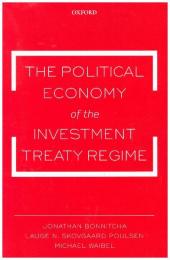 Neuerscheinungen 2017Stand: 2020-02-01 |
Schnellsuche
ISBN/Stichwort/Autor
|
Herderstraße 10
10625 Berlin
Tel.: 030 315 714 16
Fax 030 315 714 14
info@buchspektrum.de |

Jonathan Bonnitcha, Lauge N. Skovgaard Poulsen, Lauge N. Skovgaard Poulsen, Michael Waibel
(Beteiligte)
The Political Economy of the Investment Treaty Regime
2017. 368 S. 234 mm
Verlag/Jahr: OXFORD UNIVERSITY PRESS; OUP OXFORD 2017
ISBN: 0-19-871955-8 (0198719558)
Neue ISBN: 978-0-19-871955-7 (9780198719557)
Preis und Lieferzeit: Bitte klicken
Investment treaties are some of the most controversial instruments of global economic governance. This book integrates legal, economic, and political perspectives to offer the first comprehensive analysis of the political economy of the investment treaty regime, and contextualises the investment treaty regime in its broader socio-economic context.
Investment treaties are some of the most controversial but least understood instruments of global economic governance. Public interest in international investment arbitration is growing and some developed and developing countries are beginning to revisit their investment treaty policies. The Political Economy of the Investment Treaty Regime synthesises and advances the growing literature on this subject by integrating legal, economic, and political
perspectives. Based on an analysis of the substantive and procedural rights conferred by investment treaties, it asks four basic questions. What are the costs and benefits of investment treaties for investors, states, and other stakeholders? Why did developed and developing countries sign the treaties? Why should
private arbitrators be allowed to review public regulations passed by states? And what is the relationship between the investment treaty regime and the broader regime complex that governs international investment?
Through a concise, but comprehensive, analysis, this book fills in some of the many "blind spots" of academics from different disciplines, and is the first port of call for lawyers, investors, policy-makers, and stakeholders trying to make sense of these critical instruments governing investor-state relations.
Amidst a sea of conflicting counsel comes a balanced yet hard punching analysis of the international investment treaty regime. With incisive analysis from the perspectives of economics, law and political science, the authors deliver a singularly important work of clarity at a critical time for global economic order. With as much a domestic perspective as an international one, the authors illuminate highly politicised questions with a fairness that is refreshing. As nationalist tendencies rise in several corners of the globe, this volume is must read for policymakers. Professor David D. Caron, member of The Iran-United States Claims Tribunal


